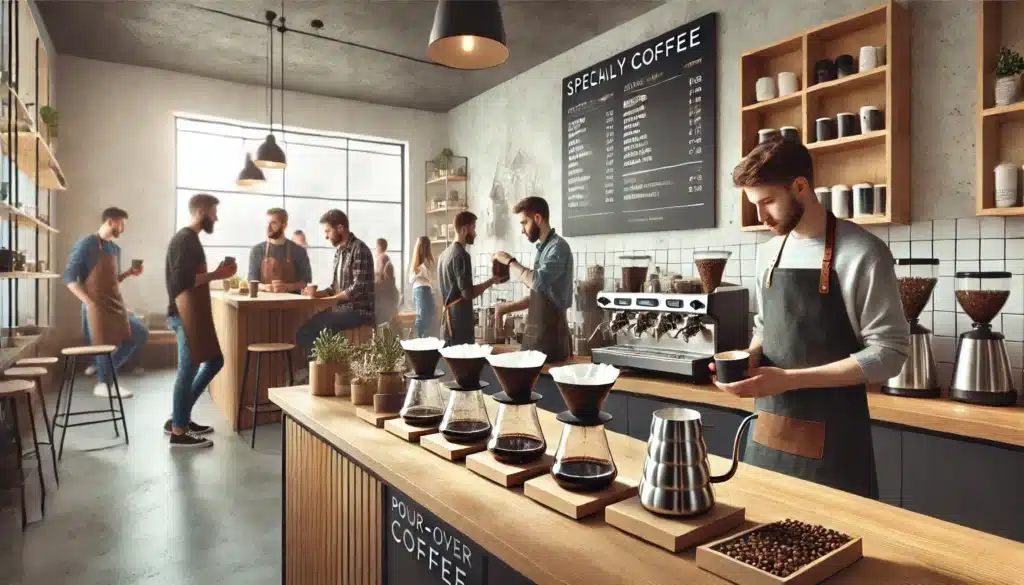Over the past few decades, specialty coffee shops have flourished worldwide. Once confined to a niche market, these cafés are now seen in bustling city centers, quiet suburbs, and even small towns. But what is driving this global trend, and what makes specialty coffee different from the average cup?
In this article, we explore the rise of specialty coffee shops, what they offer, and why they’re shaping the future of the coffee industry.
1. What Is Specialty Coffee?
Specialty coffee refers to coffee that has been carefully sourced, roasted, and brewed to highlight the unique flavors of the beans.
Key characteristics of specialty coffee include:
- Single-origin beans from high-quality farms
- High-quality processing methods (washed, natural, etc.)
- Precise roasting that brings out distinct flavor profiles
- Attention to brewing techniques (e.g., pour-over, espresso, Aeropress)
Specialty coffee shops focus on providing an experience that goes beyond a basic caffeine fix.
2. A Focus on Quality Over Convenience
Unlike traditional coffee shops, specialty cafés prioritize quality over speed. Baristas are trained to:
- Perfect brewing methods
- Ensure consistency in every cup
- Engage customers in the story behind the beans
This focus on craftsmanship and quality has led to a growing appreciation for coffee as an art form rather than just a drink.
3. From Niche to Mainstream
What was once considered a niche market has exploded into a global movement. Specialty coffee shops have expanded from major cities to smaller towns and even rural areas, driven by:
- Consumer demand for higher-quality coffee
- Increased coffee knowledge among drinkers
- The growing “third wave coffee” movement, focusing on artisanal brewing and sustainability
This transformation has turned coffee into a lifestyle for many, with specialty cafés acting as gathering places and community hubs.
4. Technology and Innovation in Specialty Coffee
Specialty coffee shops are embracing technology to ensure the perfect cup:
- Smart brewing equipment (e.g., temperature-controlled grinders, pour-over kettles)
- Precision scales for consistent brewing ratios
- Siphon coffee makers and cold brew systems for unique flavor experiences
The integration of technology enhances the consistency and quality of coffee, allowing baristas to refine their craft.
5. The Rise of Coffee as a Social Experience
Specialty coffee is not just about the coffee itself — it’s about the experience. Many specialty cafés offer:
- Tasting sessions and cuppings to explore different beans
- Barista classes and coffee workshops for enthusiasts
- Artisanal pairings of coffee with pastries, chocolate, or other delicacies
These experiences encourage customers to engage with coffee in new ways, building a deeper appreciation for the product.
6. The Global Spread of Specialty Coffee
Originally rooted in cities like Portland, Seattle, and Melbourne, specialty coffee has spread across the globe:
- Europe: Cities like London, Berlin, and Copenhagen have become coffee meccas, with hundreds of independent roasters and cafés
- Asia: Specialty coffee is gaining popularity in places like Tokyo, Seoul, and Hong Kong, blending local coffee culture with modern techniques
- Latin America: Countries that grow coffee, like Colombia and Costa Rica, have embraced the local specialty coffee scene, offering coffee tours and direct-trade models
This global spread shows that specialty coffee transcends regional boundaries, creating a unified appreciation for quality coffee worldwide.
7. The Role of Sustainability in Specialty Coffee
Sustainability is a cornerstone of the specialty coffee movement. Many specialty coffee shops prioritize:
- Ethical sourcing through direct trade or fair trade certifications
- Organic and shade-grown coffee to protect the environment
- Eco-friendly practices like compostable cups, recycling programs, and water conservation
As the demand for quality coffee grows, there is also an increasing emphasis on protecting the planet and supporting fair labor practices.
8. Specialty Coffee and the Health-Conscious Consumer
The rising interest in health-conscious lifestyles has also contributed to the popularity of specialty coffee. Many consumers are now:
- Seeking organic coffee
- Opting for low-acid options that are easier on the stomach
- Interested in coffee’s antioxidant properties and potential health benefits
Specialty coffee shops cater to these needs by offering a variety of options that prioritize both quality and wellness.
9. The Influence of Millennials and Gen Z
Millennials and Gen Z are driving much of the demand for specialty coffee, attracted by its:
- Transparency in sourcing
- Artisanal preparation
- Instagram-worthy aesthetics (latte art, unique drinks)
These generations view coffee not only as a beverage but as a form of self-expression and a social currency, further fueling the expansion of specialty coffee culture.
10. The Future of Specialty Coffee Shops
Looking forward, specialty coffee shops will continue to evolve. Trends to watch for include:
- More inclusive offerings, such as plant-based milk and low-caffeine options
- Global collaborations, connecting farmers, roasters, and cafés worldwide
- Tech innovations to improve both the coffee experience and business efficiency
Specialty coffee shops will remain central to the coffee industry, not just as places to drink coffee but as cultural spaces that educate and inspire.
Final Thoughts: A Global Coffee Movement
Specialty coffee is more than just a trend — it’s a movement that is reshaping how the world grows, brews, and consumes coffee. With a focus on quality, sustainability, and community, these cafés are here to stay, offering a richer, more thoughtful coffee experience that goes beyond the cup.







